| Listing 1 - 10 of 17 | << page >> |
Sort by
|
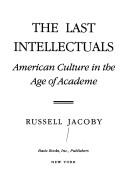
ISBN: 0465038123 Year: 1987 Publisher: New York (N.Y.) : Basic books,
Abstract | Keywords | Export | Availability | Bookmark
 Loading...
Loading...Choose an application
- Reference Manager
- EndNote
- RefWorks (Direct export to RefWorks)
Intellectuals --- -Universities and colleges --- -#SBIB:316.7C170 --- 378.014.2 <73> --- Colleges --- Degree-granting institutions --- Higher education institutions --- Higher education providers --- Institutions of higher education --- Postsecondary institutions --- Public institutions --- Schools --- Education, Higher --- Intelligentsia --- Persons --- Social classes --- Specialists --- Faculty --- Cultuursociologie: culturele groei, vooruitgang, stagnatie, technologische verandering, cultuurbewegingen --- United States --- Intellectual life --- -Intellectuals --- Universities and colleges --- Faculty. --- 20th century --- #SBIB:316.7C170
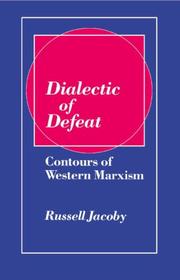
ISBN: 052123915X 0521520177 0511571445 9780521239158 9780511571442 9780521520171 Year: 1981 Publisher: Cambridge: Cambridge university press,
Abstract | Keywords | Export | Availability | Bookmark
 Loading...
Loading...Choose an application
- Reference Manager
- EndNote
- RefWorks (Direct export to RefWorks)
Observing that for both revolutionaries and capitalists, nothing succeeds like success, Russell Jacoby asks us to reexamine a loser of Marxism: the unorthodox Marxism of Western Europe. The author begins with a polemical attack on 'conformist' or orthodox Marxism, in which he includes structuralist schools. He argues that a cult of success and science drained this Marxism of its critical impulse and that the successes of the Russian and Chinese revolutions encouraged a mechanical and fruitless mimicry. He then turns to a Western alternative that neither succumbed to the spell of success nor obliterated the individual in the name of science. In the nineteenth century, this Western Marxism already diverged from Russian Marxism in its interpretation of Hegel and its evaluation of Engels' orthodox Marxism. The author follows the evolution of this minority tradition and its opposition to authoritarian forms of political theory and practice.
Communism --- Communism and philosophy --- History --- Marx, Karl, --- -Communism and philosophy --- Philosophy and communism --- Philosophy --- Bolshevism --- Communist movements --- Leninism --- Maoism --- Marxism --- Trotskyism --- Collectivism --- Totalitarianism --- Post-communism --- Socialism --- Village communities --- Marx, Karl. --- Marx, Karl --- Makesi, --- Ma-kʻo-ssu, --- 马克思, --- 馬克思, --- Marukusu, --- マルクス, --- Marx, Heinrich Karl, --- Marks, Karl, --- Marx, Carlos, --- Marks, K. --- Marŭkʻŭsŭ, Kʻal, --- 마르크스, 칼, --- Marksŭ, --- 맑스, --- Marks, Karol, --- Mác, Các, --- Marx, Karel, --- Marksas, Karolis, --- Marx, Carlo, --- Mác, C., --- מארכס, --- מארכס, קארל, --- מארכס, קרל, --- מארכס, ק --- מארקס --- מארקס, קארל --- מארקס, קארל, --- מארקס, קרל, --- מארקס, ק. --- מרכס, קרל --- מרכס, קרל, --- ماركس، كارل --- ماركس، كارل، --- Markso, Karlo, --- Arts and Humanities --- Communism - History --- Marx, Karl, - 1818-1883 --- Communism and philosophy. --- History.

ISBN: 0231502974 9780231502979 9780231128940 0231128940 9780231128957 0231128959 Year: 2005 Publisher: New York : Columbia University Press,
Abstract | Keywords | Export | Availability | Bookmark
 Loading...
Loading...Choose an application
- Reference Manager
- EndNote
- RefWorks (Direct export to RefWorks)
"The choice we have is not between reasonable proposals and an unreasonable utopianism. Utopian thinking does not undermine or discount real reforms. Indeed, it is almost the opposite: practical reforms depend on utopian dreaming."--Russell Jacoby, Picture Imperfect Utopianism suffers from an image problem: A recent exhibition on utopias in Paris and New York included photographs of Hitler's Mein Kampf and a Nazi concentration camp. Many observers judge utopians and their sympathizers as foolhardy dreamers at best and murderous totalitarians at worst. However, as noted social critic and historian Russell Jacoby argues in this salient, polemical, and innovative work, not only has utopianism been unfairly characterized, a return to an iconoclastic utopian spirit is vital for today's society. Shaped by the works of Theodor Adorno, Walter Benjamin, Ernst Bloch, Gustav Landauer, and other predominantly Jewish thinkers, iconoclastic utopianism revives society's dormant political imagination and offers hope for a better future. Writing against the grain of history, Jacoby reexamines the anti-utopian mindset and identifies how utopian thought came to be regarded with such suspicion. He challenges standard readings of such anti-utopian classics as 1984 and Brave New World and offers stinging critiques of the influential liberal and anti-utopian theorists Hannah Arendt, Isaiah Berlin, and Karl Popper. He argues that these thinkers mistakenly equate utopianism with totalitarianism. The reputation of utopian thought has also suffered from the failures of, what Jacoby terms, the blueprint utopian tradition and its oppressive emphasis on detailing all aspects of society and providing fantastic images of the future. In contrast, the iconoclastic utopians, like those who follow God's prohibition against graven images, resist both the blueprinters' obsession with detail and the modern seduction of images. Jacoby suggests that by learning from the hopeful spirit of iconoclastic utopians and their willingness to accept new possibilities for society, we open ourselves to new and more imaginative ideas of the future.
Utopias. --- Dystopias. --- Utopias --- Anti-utopias --- Ideal states --- States, Ideal --- Utopian literature --- Political science --- Socialism --- Voyages, Imaginary --- Dystopias --- Religious aspects. --- Political philosophy. Social philosophy --- Thematology --- Comparative literature --- Social ethics
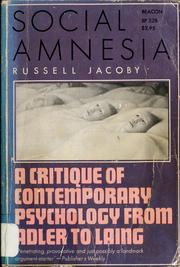
ISBN: 0807029645 Year: 1975 Publisher: Boston : Beacon Press,
Abstract | Keywords | Export | Availability | Bookmark
 Loading...
Loading...Choose an application
- Reference Manager
- EndNote
- RefWorks (Direct export to RefWorks)
Psychoanalysis --- #GBIB:CBMER --- History --- History.
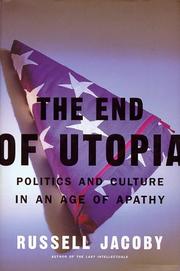
ISBN: 0465020003 0465020011 9780465020003 9780465020010 Year: 1999 Publisher: New York, N.Y. BasicBooks
Abstract | Keywords | Export | Availability | Bookmark
 Loading...
Loading...Choose an application
- Reference Manager
- EndNote
- RefWorks (Direct export to RefWorks)
In The End of Utopia, Jacoby takes a sobering look at the future of politics. He points to the abandonment of utopian ideals that once sustained dissent and movements of social change.
Political philosophy. Social philosophy --- Sociology of culture --- Intellectuals --- Politics and culture --- Liberalism --- Cultural pluralism --- #SBIB:316.7C140 --- #SBIB:321H30 --- #SBIB:324H30 --- Liberal egalitarianism --- Liberty --- Political science --- Social sciences --- Cultuursociologie: cultuur en globale samenlevingen --- Hedendaagse politieke en sociale theorieën (vanaf de 19de eeuw): algemeen (incl. utilitarisme, burgerschap) --- Politieke cultuur --- United States --- Intellectual life --- Social conditions
Book
ISBN: 9783031076466 9783031076459 Year: 2022 Publisher: Cham Palgrave Macmillan
Abstract | Keywords | Export | Availability | Bookmark
 Loading...
Loading...Choose an application
- Reference Manager
- EndNote
- RefWorks (Direct export to RefWorks)
“Everything that Russell Jacoby writes is well worth reading. He’s smart, independent, lively, well-informed and alive with the joy of intellectual combat. Agree with him or not—he makes you think and think hard about any and every subject he takes up.” —Mark Edmundson, Professor of English, University of Virginia, USA “For over fifty years, Russell Jacoby has been one of our most relentlessly contrarian critics. In lucid and punchy—ok, often snarky—prose, he has lamented the decline of genuine intellectuals, exposed the pretenses of academia, and challenged pieties on both the right and left, while all the time refusing to give up on utopian ideals. Gathering his scattershot efforts into one resounding blast of critical energy, Intellectuals in Politics and Academia is easy to argue with, but hard to put down”. —Martin Jay Ehrman, Professor of European History Emeritus, University of California, Berkeley, USA “Russell Jacoby is one of America’s very finest essayists and this collection shows his masterly combination of style and substance. His illuminating investigations of leading thinkers and his biting critique of academic conceits are alone worth the price of the book. Its range is exceptional and, as always, Jacoby shows respect for the utopian imagination and those intellectuals who defend it. These essays are provocative and, just as important, a great read. Don’t miss this book!” —Stephen Eric Bronner, Distinguished Professor of Political Science, Comparative Literature, and German Studies, Rutgers University, USA This book addresses the fate of intellectuals in modern culture and politics. Russell Jacoby’s seminal The Last Intellectuals: American Culture in the Age of Academe (1987, 2000) introduced the term “public intellectual” and gave rise to heated controversy. Here Jacoby assesses contemporary public intellectuals, their profound failings and limited achievements. The book includes biting appraisals of well-known intellectuals, such as Noam Chomsky, Hannah Arendt, and Bernard-Henri Lévy, as well as interventions on violence, utopia and multiculturalism. Russell Jacoby is Professor Emeritus of History at the University of California, USA, and the author of the author of nine books, including Repression of Psychoanalysis (1983), Bloodlust (2011), and most recently On Diversity (2020).
Philosophy. --- Mental philosophy --- Humanities --- Political science --- Intellectual life --- Political science. --- America --- Knowledge, Sociology of. --- Political Philosophy. --- Intellectual History. --- Political Theory. --- American Politics. --- Sociology of Knowledge and Discourse. --- History. --- Politics and government. --- Knowledge, Theory of (Sociology) --- Sociology of knowledge --- Communication --- Knowledge, Theory of --- Public opinion --- Sociology --- Social epistemology --- Administration --- Civil government --- Commonwealth, The --- Government --- Political theory --- Political thought --- Politics --- Science, Political --- Social sciences --- State, The --- Intellectual history --- Political philosophy --- Philosophy and psychology of culture --- Political philosophy. Social philosophy --- Sociology of culture
Book
ISBN: 0855278404 0855278501 Year: 1977 Publisher: Hassocks, Eng. : Harvester Press,
Abstract | Keywords | Export | Availability | Bookmark
 Loading...
Loading...Choose an application
- Reference Manager
- EndNote
- RefWorks (Direct export to RefWorks)
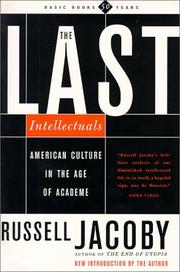
ISBN: 0465036252 Year: 2000 Publisher: New York (N.Y.) Basic Books
Abstract | Keywords | Export | Availability | Bookmark
 Loading...
Loading...Choose an application
- Reference Manager
- EndNote
- RefWorks (Direct export to RefWorks)
Book
Year: 1978 Publisher: Bloemendaal Nelissen
Abstract | Keywords | Export | Availability | Bookmark
 Loading...
Loading...Choose an application
- Reference Manager
- EndNote
- RefWorks (Direct export to RefWorks)
Book
ISBN: 9782714451354 Year: 2014 Publisher: Paris : Belfond,
Abstract | Keywords | Export | Availability | Bookmark
 Loading...
Loading...Choose an application
- Reference Manager
- EndNote
- RefWorks (Direct export to RefWorks)
À l'heure où s'exacerbent les extrémismes, où attentats, guerres civiles, répressions font rage, on a tôt fait d'assimiler cette violence inouïe au choc des cultures et à la peur de la différence. Prenant l'exact contrepied du discours ambiant, l'un des plus grands intellectuels américains contemporains bouscule les idées reçues et relance le débat : c'est de la peur du semblable que naît la violence. Convoquant aussi bien la philosophie que la psychanalyse freudienne et les sciences humaines, Russell Jacoby revisite cinq mille ans d'Histoire, du mythe fondateur d'Abel et Caïn à la Saint-Barthélemy, de la Shoah au génocide rwandais, et propose de nouvelles pistes de réflexion passionnantes. Pourquoi les guerres civiles sont-elles les plus meurtrières ? Comment expliquer que les massacres les plus abominables aient été perpétrés par des bourreaux proches de leurs victimes ? Aurions-nous plus à craindre de notre propre voisin ? Aujourd'hui plus que jamais, il y a urgence à interroger les ressorts de la violence, pour mieux oeuvrer pour la paix.
Violence --- Genocide --- Génocide --- Psychological aspects --- Social aspects. --- Philosophy --- Aspect psychologique --- Aspect social --- Philosophie
| Listing 1 - 10 of 17 | << page >> |
Sort by
|

 Search
Search Feedback
Feedback About UniCat
About UniCat  Help
Help News
News